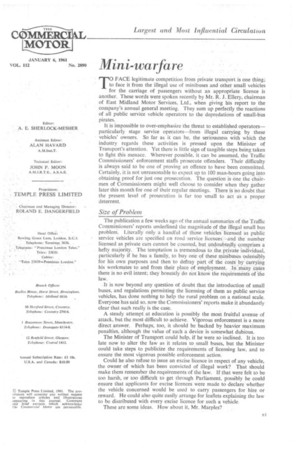Mini-warfare
Page 35

If you've noticed an error in this article please click here to report it so we can fix it.
TO FACE legitimate competition from private transport is one thing; to face it from the illegal use of minibuses and other small vehicles for the carriage of passengers without an appropriate licence is another. These words were spoken recently by Mr. R. .1. Ellery, chairman of East Midland Motor Services, Ltd., when giving his report to the company's annual general meeting. They sum up perfectly the reactions of all public service vehicle operators to the depredations of small-bus pirates.
It is impossible to over-emphasize the threat to established operators-particularly stage service operators—from illegal carrying by these vehicles' owners. So far as it can be, the seriousness with which the industry regards these activities is pressed upon the Minister of Transport's attention. Yet there is little sign of tangible steps being taken to fight this menace. Wherever possible, it can be assumed, the Traffic Commissioners' enforcement staffs prosecute offenders. Their difficulty is always said to be one of proving an offence to have been committed. Certainly, it is not unreasonable to expect up to 100 man-hours going into obtaining proof for just one prosecution. The question is one the chairmen of Commissioners might well choose to consider when they gather later this month for one of their regular meetings. There is no doubt that the present level of prosecution is far too small to act as a proper deterrent.
Size of Problem The publication a few weeks ago of the annual summaries of the Traffic Commissioners' reports underlined the magnitude of the illegal small bus problem. Literally only a handful of those vehicles licensed as public service vehicles are specified on road service licences —and the number licensed as private cars cannot be counted, but undoubtedly, comprises a hefty majority. The temptation is tremendous to the private individual, particularly if he has a family, to buy one of these minibuses ostensibly for his own purposes and then to defray part Of the costi by carrying his workmates to and from their place of employment. In. many cages there is no evil intent; they honestly do not knoVii the req— uirements of The law.
-It is now beyond any question of doubt that the introduction of small buses, and regulations permitting the licensing of them as public service vehicles, has done nothing to help the rural problem on a national scale. Everyone has said so, now the Commissioners' reports make it abundantly clear that such really is the case.
A steady attempt at education is possibly the most fruitful avenue of attack, but the most difficult to achieve. Vigorous enforcement is a more direct answer. Perhaps, too, it should be backed by heavier maximum penalties, although the value of such a device is somewhat dubious.
The Minister of Transport could help, if he were so inclined. It is too late now to alter the law as it relates to small buses, but the Minister could take steps to publicize the requirements of licensing law, and to ensure the most vigorous possible enforcement action.
Could he also refuse to issue an excise licence in respect of any vehicle, the owner of which has been convicted of illegal work? That should make them remember the requirements of the law. If that were felt to be too harsh, or too difficult to get through Parliament, possibly he could ensure that applicants for excise licences were made to declare whether the vehicle concerned would be used to carry passengers for hire or reward. He could also quite easily arrange for leaflets explaining the law to be distributed with every excise licence for such a vehicle.
These are some ideas. How about it, Mr. Marples?




















































































































